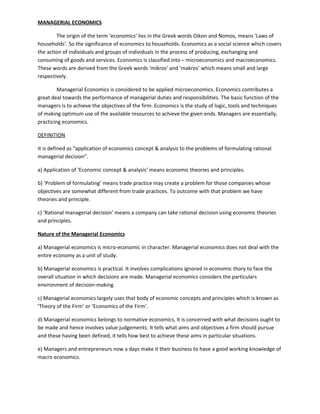
Managerial economics
- 1. MANAGERIAL ECONOMICS The origin of the term ‘economics’ lies in the Greek words Oikon and Nomos, means ‘Laws of households’. So the significance of economics to households. Economics as a social science which covers the action of individuals and groups of individuals in the process of producing, exchanging and consuming of goods and services. Economics is classified into – microeconomics and macroeconomics. These words are derived from the Greek words ‘mikros’ and ‘makros’ which means small and large respectively. Managerial Economics is considered to be applied microeconomics. Economics contributes a great deal towards the performance of managerial duties and responsibilities. The basic function of the managers is to achieve the objectives of the firm. Economics is the study of logic, tools and techniques of making optimum use of the available resources to achieve the given ends. Managers are essentially, practicing economics. DEFINITION It is defined as “application of economics concept & analysis to the problems of formulating rational managerial decision”. a) Application of ‘Economic concept & analysis’ means economic theories and principles. b) ‘Problem of formulating’ means trade practice may create a problem for those companies whose objectives are somewhat different from trade practices. To outcome with that problem we have theories and principle. c) ‘Rational managerial decision’ means a company can take rational decision using economic theories and principles. Nature of the Managerial Economics a) Managerial economics is micro-economic in character. Managerial economics does not deal with the entire economy as a unit of study. b) Managerial economics is practical. It involves complications ignored in economic thory to face the overall situation in which decisions are made. Managerial economics considers the particulars environment of decision-making. c) Managerial economics largely uses that body of economic concepts and principles which is known as ‘Theory of the Firm’ or ‘Economics of the Firm’. d) Managerial economics belongs to normative economics, It is concerned with what decisions ought to be made and hence involves value judgements. It tells what aims and objectives a firm should pursue and these having been defined, it tells how best to achieve these aims in particular situations. e) Managers and entrepreneurs now a days make it their business to have a good working knowledge of macro economics.
- 2. Scope of managerial economics Micro economics and micro economics are applied to business analysis and decision making directly or indirectly. Managerial economics comprises, therefore, both micro and macro economic theories. The scope of managerial economics is economics applied to the analysis of business problems and decision making, it is applied economics. 1. Demand Analysis – A major part of managerial decision-making depends on accurate estimates of demand. Demand analysis includes demand determinants, demand distinctions and demand forecasting. Demand analysis is essential for business planning and occupies a strategic place in managerial economics. 2. Supply Analysis – Important aspects of supply analysis are: supply schedule, curves functions, law and elasticity of supply and factors influencing supply. 3. Cost Analysis – Cost analysis includes, cost concepts and classifications, cost output relationships, economies and diseconomies of scale and cost control and cost reduction. 4. Pricing Decisions – In managerial economics, pricing is a very important area. The success of a business firm largely depends on the correctness of the price decisions taken by it. Pricing decisions consider price determination in various market firms, pricing methods, differential pricing, product line pricing and price forecasting. 5. Profit – The important aspects covered under this area are nature and measurement of profit, profit policies and techniques of profit planning like Break-even analysis. 6. Capital Management – The most complex for the business manager are likely to be those relating to the firms capital investments. Capital management implies and control of capital expenditure. Capital management covered cost of capital, rate of return and selection of projects. MANAGERIAL ECONOMICS IN DECISION MAKING The prime function of a management executive in a business organization is decision-making. Decision making means the process of selecting one action from two or more alternative courses of action. The decision making function becomes one of making choices that will provide the most efficient means of attaining a desired end, profit maximization. Once a decision is made about the particular goal to be achieved, plans as to production, pricing, capital, raw materials, labours etc. are prepared. A manager has to take a number of decisions in conformity with the goals of the firm. Many business decisions are taken under the condition of uncertainity and therefore involve risk. Uncertainity and risk arise mainly because because of demand and supply, changing business environment, government policy, social and political changes in the country. The degree of uncertainity and risk can be greatly reduced if market conditions could be predicted with a high degree of reliability. What is equally important is to take appropriate business decision and to formulate business strategy conforming to the goals of the firm.
